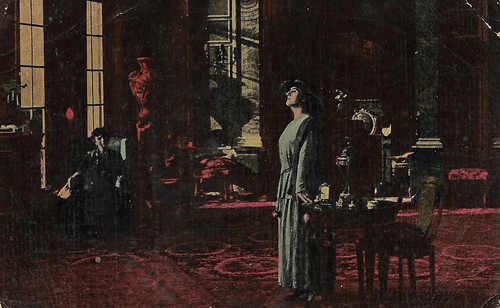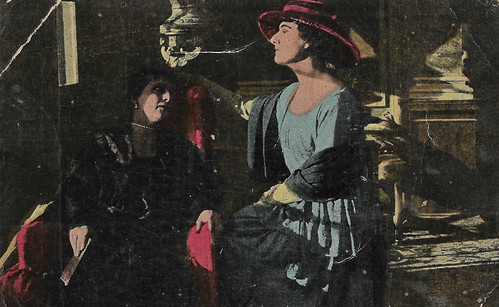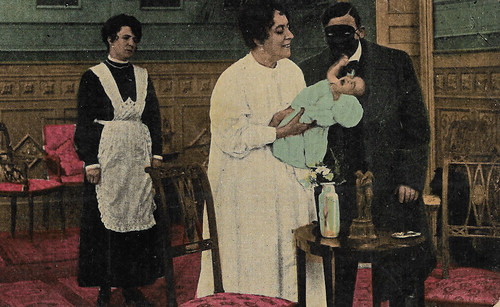
Spanish cromo by Chocolate Imperial in the Series 'Los siete pecados capitales' (The Seven Capital Sins), no. 1. Photo: Caesar Film / Spanish distr. J. Gurgui, Barcelona. Nella Montagna in L'orgoglio/La superbia (Edoardo Bencivenga, 1918). The Spanish film title was Soberbia.

Spanish cromo by Chocolate Imperial in the Series 'Los siete pecados capitales' (The Seven Capital Sins), no. 2. Photo: Caesar Film / Spanish distr. J. Gurgui, Barcelona. Publicity still for L'orgoglio/La superbia (Edoardo Bencivenga, 1918).

Spanish cromo by Chocolate Imperial in the Series 'Los siete pecados capitales' (The Seven Capital Sins), no. 7. Photo: Caesar Film / Spanish distr. J. Gurgui, Barcelona. Francesca Bertini in L'orgoglio/La superbia (Edoardo Bencivenga, 1918).

Spanish cromo by Chocolate Imperial in the Series 'Los siete pecados capitales' (The Seven Capital Sins), no. 8. Photo: Caesar Film / Spanish distr. J. Gurgui, Barcelona. Francesca Bertini (right) in L'orgoglio/La superbia (Edoardo Bencivenga, 1918).

Spanish cromo by Chocolate Imperial in the Series 'Los siete pecados capitales' (The Seven Capital Sins), no. 9. Photo: Caesar Film / Spanish distr. J. Gurgui, Barcelona. Nella Montagna and Cia Fornaroli in L'orgoglio/La superbia (Edoardo Bencivenga, 1918).

Spanish cromo by Chocolate Imperial in the Series 'Los siete pecados capitales' (The Seven Capital Sins), no. 10. Photo: Caesar Film / Spanish distr. J. Gurgui, Barcelona. Cia Fornaroli and Francesca Bertini in L'orgoglio/La superbia (Edoardo Bencivenga, 1918).
The fruit of a sinful relationship
I sette peccati capitali (The Seven Capital Sins) was a series of films directed in 1918-1919 by various directors but always starring Italian diva Francesca Bertini. The episode L'orgoglio/La superbia/Pride (1918) and Soberbia in Spanish, was directed by Edoardo Bencivenga. The series was inspired by Eugène Sue's popular novel 'Les sept péchés capitaux'. Sue was a famed serial writer, well known for 'Les mystères de Paris' (1842-1843). The plot of the film as described in Vittorio Martinelli's 'Il cinema muto italiano, Vol. 1918', is partly incorrect. We used the original Spanish leaflets, issued in Spain by Caesar Film, which are in our collection. The order of the numbers on our Spanish Cromos (indicated on the back) may not be synchronous with the order of the plot, but the moments of the plot are clearly recognisable.
In L'orgoglio/La superbia (Edoardo Bencivenga, 1918), politician Ubaldo Maillefort hears his powerful enemies are about to have him arrested, so he gives his daughter in custody to an honorable family. Before leaving he hangs a medallion around her neck with the portrait of her mother, countess Maria de Beaumesnil. The portrait will play an essential role later on. The love between Maria and Ubaldo was not allowed because of her proud and old-fashioned parents. None but the old servant of Ubaldo knows about the secret and he is arrested, and the baby is raised by a good woman who names her Erminia, raises her as if she was her own child, and lets her study to become a professional pianist.
Meanwhile, her real mother has been forced to marry count Villepreux, and they have a daughter Ernestina (Cia Fornaroli). After getting amnesty, Ubaldo returns, while the countess, now widowed, is nearing her end. Not knowing her real parents, Erminia starts to work for the countess and discovers through the medallion that she is her mother. However, the countess dies without having recognised her daughter. Devastated, Erminia realises that she is the fruit of a sinful relationship and decides not to tell out of respect.
The haughty duchess de Santerre (Nella Montagna) is now charged with the guardianship of Ernestina, her niece. At the pompous funeral, Erminia is the only one to really shed tears. Afterward, the duchess pays Erminia for her services, but the latter refuses the humiliating money. Gerardo de Santerre overhears the dialogue and falls in love with her. Hiding his name he courts her, but when his friend, the engineer Oliviero, tells her who he is, she proudly rejects Gerardo.
Meanwhile, Ernestina, fed up with the courting men around her, focuses on charity. Visiting an attic in the house where Erminia also lives, she is overwhelmed by a gang of crooks, but Erminia at gunpoint pushes the malefactors back. Oliviero, who has followed Erminia, witnesses the scene. Love is born between Oliviero and Ernestina, while Gerardo curses his nobility causing Erminia's refusal.
When he tells his mother of his plans she blankly refuses, no duke with a commoner! Instead, Oliviero's parents have no problems with Ernestina as his future bride. Gerardo proposes himself to Erminia, but she only accepts if the duchess comes to ask for her hand. Gerardo is on the verge of suicide and writes so to his mother, who then finally gives in. It is then that Erminia reveals she is the countess of Beausmenil and thus half-sister of Ernestina. When the old countess finally falls on her knees for Erminia, begging for Gerardo's life, Erminia is moved and embraces her with both arms.
Although launched with a big campaign, the series I sette peccati capitali was less successful at the time than expected. The integral version of I sette peccati capitali was believed lost until it was discovered at the Prague Film Institute (Ceskoslovensky Filmovy Archiv). It was carefully restored including the tinting and shown at Il Cinema Ritrovato in Bologna in 1991 (the first restorations of L'avarizia and L'orgoglio), and in 2003 the complete series.
The seven pictures of I sette peccati capitali are L'orgoglio/La superbia/Pride, Gula/Gluttony, Ira/Wrath and L'avarizia/Greed (1918), L'invidia/Envy, L'accidia/Sloth and Lussuria/Lust (1919). Judging from the photos in the Spanish leaflets, Gregorio was possibly played by Livio Pavanelli but his name is unmentioned in all sources on Bertini, IMDb, etc. Of course, the photos on the leaflets may have been misplaced. Guido Trento probably played Oliviero. It is also unclear who played Maillefort, the countess de Beaumesnil, and the old servant. The name of Renato Trento is mentioned in many sources but we could not trace any pictures of him.

Spanish cromo by Chocolate Imperial in the Series 'Los siete pecados capitales' (The Seven Capital Sins), no. 11. Photo: Caesar Film / Spanish distr. J. Gurgui, Barcelona. Publicity still for L'orgoglio/La superbia (Edoardo Bencivenga, 1918).

Spanish cromo by Chocolate Imperial in the Series 'Los siete pecados capitales' (The Seven Capital Sins), no. 12. Photo: Caesar Film / Spanish distr. J. Gurgui, Barcelona. Cia Fornaroli in L'orgoglio/La superbia (Edoardo Bencivenga, 1918).

Spanish cromo by Chocolate Imperial in the Series 'Los siete pecados capitales' (The Seven Capital Sins), no. 14. Photo: Caesar Film / Spanish distr. J. Gurgui, Barcelona. Francesca Bertini as Emilia in L'orgoglio/La superbia (Edoardo Bencivenga, 1918). Erminia recognizes countess Maria as her mother, but the latter dies before reconciliation can take place and Erminia keeps silent about her birth out of wedlock.

Spanish cromo by Chocolate Imperial in the Series 'Los siete pecados capitales' (The Seven Capital Sins), no. 15. Photo: Caesar Film / Spanish distr. J. Gurgui, Barcelona. Francesca Bertini and Cia Fornaroli in L'orgoglio/La superbia (Edoardo Bencivenga, 1918).

Spanish cromo by Chocolate Imperial in the Series 'Los siete pecados capitales' (The Seven Capital Sins), no. 16. Photo: Caesar Film / Spanish distr. J. Gurgui, Barcelona. Francesca Bertini in L'orgoglio/La superbia (Edoardo Bencivenga, 1918).

Spanish cromo by Chocolate Imperial in the Series 'Los siete pecados capitales' (The Seven Capital Sins), no. 17. Photo: Caesar Film / Spanish distr. J. Gurgui, Barcelona. Francesca Bertini in L'orgoglio/La superbia (Edoardo Bencivenga, 1918).

Spanish cromo by Chocolate Imperial in the Series 'Los siete pecados capitales' (The Seven Capital Sins), no. 18. Photo: Caesar Film / Spanish distr. J. Gurgui, Barcelona. The widowed countess Maria (unknown actress), her daughter Ernestina (Cia Fornaroli), and between them, their relative, the proud duchess of Santerre (Nella Montagna) in L'orgoglio/La superbia (Edoardo Bencivenga, 1918).

Spanish cromo by Chocolate Imperial in the Series 'Los siete pecados capitales' (The Seven Capital Sins), no. 19. Photo: Caesar Film / Spanish distr. J. Gurgui, Barcelona. Francesca Bertini as Erminia in L'orgoglio/La superbia (Edoardo Bencivenga, 1918). Erminia is the only one to shed tears at her mother's funeral.

Spanish cromo by Chocolate Imperial in the Series 'Los siete pecados capitales' (The Seven Capital Sins), no. 20. Photo: Caesar Film / Spanish distr. J. Gurgui, Barcelona. Francesca Bertini in L'orgoglio/La superbia (Edoardo Bencivenga, 1918).

Spanish cromo by Chocolate Imperial in the Series 'Los siete pecados capitales' (The Seven Capital Sins), no. 21. Photo: Caesar Film / Spanish distr. J. Gurgui, Barcelona. Francesca Bertini (right) and Nella Montagna in L'orgoglio/La superbia (Edoardo Bencivenga, 1918).

Spanish cromo by Chocolate Imperial in the Series 'Los siete pecados capitales' (The Seven Capital Sins), no. 22. Photo: Caesar Film / Spanish distr. J. Gurgui, Barcelona. Francesca Bertini as Erminia in L'orgoglio/La superbia (Edoardo Bencivenga, 1918). Erminia watches the portrait of her deceased mother.

Frontside of a Spanish brochure by Caesar Film for the Italian silent film L'orgoglio/La superbia (Edoardo Bencivenga, 1918).

One page of the Spanish brochure by Caesar Film for the Italian silent film L'orgoglio/La superbia (Edoardo Bencivenga, 1918), starring Francesca Bertini. The man looks like Livio Pavanelli.
Sources: original Spanish leaflets by Caesar Film and IMDb.
No comments:
Post a Comment